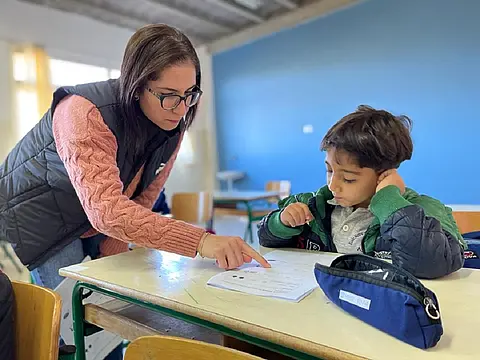Effort will support more than 350,000 children across 1,200 schools
RESEARCH TRIANGLE PARK, N.C. - RTI International, a nonprofit research institute and leading international development organization, has been selected by the U.S. Agency for International Development (USAID) to lead a new five-year program to support Lebanon’s education system capacity to plan, budget, deliver, monitor, evaluate and institutionalize quality educational services by providing in-depth technical assistance to the Ministry of Education and Higher Education (MEHE) and the Center for Educational Research and Development (CERD).
Through the MEHE and the CERD, the Government of Lebanon has outlined an ambitious set of reforms and goals in its five-year General Education Plan. Under USAID Quality Instruction Towards Access and Basic Education Improvement (QITABI) 3, RTI and our partners will support the government to improve reading, math, social and emotional learning (SEL), and inclusive education outcomes across grades 1 to 6. The program will also improve academic competencies and provide life skills and career guidance at the intermediate and secondary level. The program’s experienced consortium includes World Learning, Inc., the Ana Aqra Association, the Smart Kids with Individual Learning Differences (SKILD) Center, and INJAZ Lebanon.
“A quality basic education breaks down barriers and opens the door to a brighter future,” said Paulette Assaf, chief of party for the new program. “RTI will leverage the expertise of our consortium to deliver a program that aligns with local priorities, transforming schools to better prepare their students and youth to achieve their educational aspirations.”
At the school level, all stakeholders play a role in establishing SEL and a positive school climate. Building on QITABI 2’s pilot of school SEL plans, QITABI 3 will empower school communities to develop and deliver in-kind, grant-funded projects that focus on creating inclusive, resilient and SEL-supportive schools. Building off QITABI 2’s assessment tools and early warning system, the program will leverage RTI’s Tangerine:Teach software to improve data collection, support instruction and monitor key performance indicators.
In Lebanon, the economic crisis has forced many parents to prioritize basic needs over education. By engaging with parents and other caregivers, including through parent councils, QITABI 3 will seek to increase the support for learning and build greater confidence in public schools. QITABI 3 will also increase caregivers’ agency to support their children’s learning and motivate caregivers to ensure their children attend, persist and thrive in school.
Over the course of the next five years, USAID’s QITABI 3 program will create the foundation for locally developed interventions to improve learning outcomes and sustain key reforms to its teachers’ and principals’ instructional and leadership practices. QITABI 3 will also improve learning outcomes for approximately 350,000 learners; enhance instructional practices for 25,000 teachers; increase retention rates across 1,200 public and low-cost private schools; and strengthen the system to ensure access to more equitable learning opportunities for the most disadvantaged and for children with disabilities.
Learn more about RTI’s work in international education
